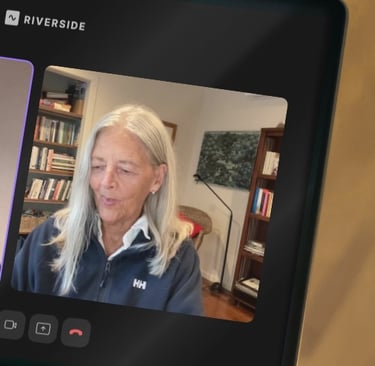
Episode Transcript
“From Global to Local: Redefining Progress"
Guest: Helena Noberg-Hodge
Introduction
Helena Norberg-Hodge is a pioneer of the localization movement, founder and director of Local Futures, and author of the influential book Ancient Futures. For over four decades, she has worked with communities around the world to rebuild local economies, restore human-scale systems, and challenge the destructive logic of global corporate growth.
In this conversation, Helena shares what she learned living in Ladakh, how globalization undermines happiness and democracy, and why reconnecting—both with people and with nature—is the foundation for real change.
Discovering a Different Way of Living in Ladakh
Sara Rego: Decades ago, your work began with a profound experience in Ladakh, before it was opened to the global economy. What was it about Ladakh that fundamentally shifted your view of Western progress and led to the localization movement?
Helena: Ladakh had been protected from colonial trade and missionary influence, so people could develop their own systems in harmony with their environment. Despite living in a high-altitude desert, they maintained stable populations, valued women’s work, and kept a well-balanced culture. As one of the first outsiders, I learned the language fluently and truly got to know the people. I saw firsthand how they lived with far less work, fewer possessions, and yet far more happiness, community, and balance than anything I had experienced in the modern world. Returning to Sweden, I suddenly understood why our “advanced” society struggled with depression, alcoholism, and suicide. Ladakh revealed what we had lost.
Corporate Power, Globalization, and the Erosion of Democracy
Sara Rego: Today, corporations seem to overshadow governments, and profit often overrides people and the planet. How can empowering local communities help restore democratic power?
Helena: Many aspects of life—food, care, even birth and dying—have been taken over by commercial systems that are inhuman and often cruel. Traditional communities managed these things far better. Meanwhile, governments around the world have signed agreements giving corporations rights above national laws. If governments interfere with profits, they can be sued. Few citizens understand how deeply economic deregulation shapes everything. What we need is not more technology or centralized systems but a return to human-scale local economies where decisions are transparent and culturally grounded.
"Meanwhile, governments around the world have signed agreements giving corporations rights above national laws."
The Systemic Picture: What Most People Don’t See
Helena: There’s enormous frustration directed at politics, but people still think in terms of left vs. right. That divide no longer explains our reality. The real divide is between global corporate power and local democratic power. People work on isolated issues—poverty, climate, refugees—but not enough energy goes into explaining the system that creates these problems. Globalization increases inequality, extinguishes species and cultures, and concentrates wealth in the hands of absentee corporations. For example, GDP rises with pollution, illness, and environmental destruction. How can environmentalists ignore that? Our measure of progress rewards breakdown.
AI, Technology, and the Loss of Local Control
Helena: AI is fine for us individually, such as you using it in this podcast to spread awareness. But when used by corporations to replace people with machines, it becomes environmentally and socially destructive. On a crowded, polluted planet, we cannot allow industries to use more and more energy, water, and minerals while employing fewer people. This is madness. We should instead incentivize businesses to use less energy and more people.
Localization as a Path to Regeneration
Sara Rego: How can we reclaim meaning in a world where so many feel alienated?
Helena: By seeing the big picture—and by reconnecting. People are desperate for community and meaning. Local food systems are a perfect example: farmers’ markets, small farms, and community-supported agriculture. Small diversified farms outperform industrial agriculture on every measure—productivity, biodiversity, employment—yet industrial food appears cheaper only because of subsidies and hidden environmental costs. Localization reconnects us with the land, with food, and with one another. It is not about nationalism or isolation; it’s about restoring human scale.
"Localization reconnects us with the land, with food, and with one another. It is not about nationalism or isolation; it’s about restoring human scale."
Women, the Feminine, and Social Healing
Sara Rego: You often emphasize women’s role in building resilient communities. How can empowering the feminine help repair our fractured society?
Helena: In Ladakh, extended families lived intergenerationally. Boys cared for babies; men expressed their nurturing side. Women were respected and central to social cohesion. But globalization imported a juvenile male culture obsessed with speed, competition, and violence. It harms boys as much as girls. Last year, we ran a program called Feminine Futures, bringing together women from around the world. Our focus was on reclaiming the feminine—care, listening, vulnerability—for both men and women. This counters polarization and restores balance. People everywhere are creating listening circles, men’s circles, women’s circles. When we know each other deeply, external pressures—beauty, success, achievement—lose their power. And singing together—something humanity did for millennia—creates joy and belonging. Modernity has turned us into spectators, not participants.
Rebuilding Meaning Through Local Action
Sara Rego: What can ordinary people do when global issues feel overwhelming?
Helena: We summarize our approach with five words: Reconnect. Rethink. Resist. Renew. Rejoice. Reconnect — Build real relationships. Change “I” to “we.” Meet friends, share meals, walk in nature. Loneliness is at the heart of today’s mental-health crisis. Rethink — Explore how we’ve been misled about progress. Schooling, for instance, was never meant to be age-segregated. It separated children from community, culture, and real learning. Resist — Don’t be afraid to say no. The idea that “focusing on the negative gives it power” has been co-opted by big business. Silence is what gives harmful systems power. Renew — Support small, local initiatives: community farms, local crafts, eco-villages, co-housing. The renewal of life happens at the human scale. Rejoice — Appreciate life as a miracle. Each person, each blade of grass, each breath. Localization is a return to what is most human and most alive. That’s why I speak of ancient futures, local futures, feminine futures—and ultimately, the economics of happiness.
"Silence is what gives harmful systems power. Renew — Support small, local initiatives: community farms, local crafts, eco-villages, co-housing. The renewal of life happens at the human scale."
Closing
Sara Rego: Thank you, Helena, for sharing your wisdom and for decades of work helping people reconnect with each other and the Earth. It has been an honor.
Photo: Hans-Jurgen Mager


Explore our podcast
Join our community on Social Media
© 2026. All rights reserved.


